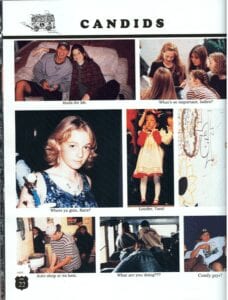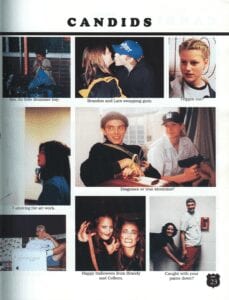Today I am kicking off the first part of chapter 2 of my blog-to-book project: Life After High School: Secrets To A Successful Life By Those Who Have Had Twenty Years To Think About It (or) What They Didn’t Teach Us Gen Xers In High School. Today I am taking a moment to reflect on a few of my humorous memories—the ones I am not too embarrassed about. Those that know me well, know that it is challenging to find appropriate stories, LOL. If you missed the last post, click here, otherwise, you can start at the beginning here.
Independent REACH
Upon receiving the invitation to my twenty year high school reunion, I knew my first course of action immediately. It was an instinct that I am guessing just about every member of the class of 1996 with any sense of sentimentality did simultaneously; I sent a text message to my best friend to see if he was going to go. It was an involuntary reflex! Why do we do that? Anyway, Scott McKinstry is that guy for me. For whatever reason, I stayed in touch with him every other day or every other six months since high school, and this particular event was of great significance to me. Scott is a great man and a dear friend. However, his somewhat lackluster response was not a surprise.
I interpreted it as one of ambivalence (sorry if you didn’t mean for it to come off that way Scott), and he firmly replied that he did think he would definitely maybe consider the possibility of perhaps mulling over the idea of maybe going. It could be that he was really excited and I didn’t see it. For some reason, I am way more apt to jump to a level of enthusiasm that resembles a small male lap dog seeing a big female dog in heat stroll on by the house. To me, everybody else seems really subdued. I mean, this whole twenty-year shell-shock flashback is at least worth a fit of barking and heavy breathing for crying out loud. My guess is that Scott had what you humans call a “normal” reaction. Whatever.
For some reason, Scott and I decided we were going to make a family trip of it. We would stay at our parent’s house in Anacortes. By “our parents” I mean his parents (I affectionally demanded to be adopted into his family sometime in the late nineties—we only children can be quite pertinacious at times). Scott and I thought it would be a smashing good time to bring the spouses and the kids and everything for the weekend (more on why this may not be a good idea for you later in the guided tour). As far as we were concerned, if we changed our mind about attending, or the reunion didn’t work out, we had an excuse to get together and hang out like old times.
In high school, Scott and I were so busy with all our independent projects that we often had late nights at each other’s homes and ended up either pulling all-nighters to finish a physics project or memorizing lines for a play due the next day. To us, this seemed perfectly normal, even after all these years.
You may or may not be aware of this, but we did have some unique things going on in our generation. We technically are part of generation X, but not really. We are at the tail end before the big echo boom and the millennials (Generation Y, then Z, then the Walking Dead’s or whatever). We are a left-over non-generation, depending on which chart you look at. The interesting thing is that the baby boomers who ran the system we grew up in were having kids (that were much younger than us) and were mostly focused on the elementary levels. Still, a lot of great experiments were starting to happen at the high school level in public education in the spirit of “reform” and fancy new pop-psychology ideals, all in the name of change, and other hippy stuff. The mid-to-late 1990’s represented a transitional time in education, where the old system was being disregarded and new experiments were being embraced. They were breaking new ground. At Anacortes High School, that ground-breaking new program was called REACH.
The basic idea (from this self-proclaimed expert) of REACH was that kids would learn more through independent projects they were interested in and by using more of their natural learning preferences, than if they were to do the old standardized methods of rote and testing. I guess it was like an independent study hall where you reach for the stars. I think the acronym meant something, but I can’t remember. It was probably Real Earthy Approach to Children’s Habitats or something.
Before you think I am bashing the program, I will go on the record by saying I loved it and I feel we benefited greatly because of it, and the pioneer of the program, Mr. Miller, deserves to be applauded for the effort. Unfortunately, he was up against a very difficult wall of resistance and the program wasn’t given the full support it needed to thrive.
Everyone was really excited about the new program. At least, the more “progressive” teachers were, although it was a bit idealized. Sadly (or inevitably?) the REACH program ended up being a stretch. In a few years, they had to fold the entire program and the result was that the local education system went back to a sort of old-fashioned standardization, but to an even greater extreme (since that is always what seems to happen on pendulums of social experiments). Allegedly, the problem with REACH was that too many kids were doing nothing with their freedom and didn’t embrace the independent nature of it.
And by nothing I literally mean nothing. A few years after our class escaped into the world, there were complaints about kids wandering around in the mall instead of going to school. It ended up a complete disaster on the whole.
So this entire failure of a program was alive just long enough to “destroy the minds” of a select few graduating classes, starting with ours. Yet, the kind of destroying it did for me was exactly what I needed to break out of my shell and do some really fun and creative projects. Overall, I am grateful for that time.
In all fairness, I think some of us in the program really did have the independent minds that flourished in it. Jason Mann told me recently that even though there was a bit of goofing off, it wasn’t any more than kids did in other classes, and when the deadline arrived, “We always produced something.” We had some teachers that knew we wanted to do cool stuff and they just let us. (Gotta love me some Mr. Miller). After all, what other kids in what other high schools do you know of who are encouraged to create and perform their own musical version of Lord Of The Flies and have it actually do well in front of an audience? Shout out to my old chum McKinstry again, and all the cool kids from our English REACH class that pulled that magic off during the middle of a school day.
The completely ludicrous thing is that for Scott and I, the REACH program just wasn’t enough of a stretch. We weren’t satisfied even with that level of freedom and utter lack of responsibility compared to the system’s norms. We couldn’t be content just having REACH—we made a strong argument for, and won the right to create—INDEPENDENT REACH…Yes, I just said that. I’m serious. No, really. It’s actually redundant to say: “Independent Reach”. It’s like saying: “affirmative yes,” or “armed gunman,” or “absurdist ridiculousness” (mostly the latter example).
It wasn’t the REACH program that was at fault for crazy teenagers. It was the crazy teenagers that were attempting to take over the asylum and it didn’t matter what program they were in.
What a farcical idea! I helped create it, and even I admit it is preposterous! Who would have let us do that?! It actually said, “INDEPENDENT REACH” on our report cards! Obviously, we did this because the regular program was way too mainstream for us. We really needed to push the envelope and be different and special. Who did we think we were? Well, we thought we owned the school. We did, after all, write the disciplinary policy for the vice Principal—but that’s another story.
One time, at the beginning of senior year, at a small assembly of our class, when we were all fighting the administration about an issue regarding senior lockers, they were winning an argument that would break tradition and require all the lockers be mixed up so there was no more “class warfare”. In other words, every year since the beginning of time, seniors could have their lockers next to each other to be with their friends as a way of saying, “Congratulations. You didn’t flunk out yet, so here is your paltry consolation prize for putting up with the beatings from upperclassman all these years”. It was a serious benefit that we had earned and were excited to receive—when all of a sudden they were choosing our class to profane the locker gods and make this unholy change!
They chose to try pulling this fast one on us, probably because as a whole, we were a very agreeable class, and usually had pretty good relationships with our teachers. We didn’t really speak out too much or stir the pot unnecessarily. We were pretty happy kids for the most part, compared to some of the other classes. In our polite way we were trying to gain ground in the argument, but failing the debate, and it was looking like the depraved idea of ending the senior locker tradition was going to be made against our will.
Now, at risk of sounding like I am tooting my own horn, I am going to tell you that I did save the day for us that one time. I don’t even remember exactly what I said, but I do remember getting up and lambasting Vice Principal Mrs. Brungess with some really stellar rhetoric and master-debater skills (it seemed that a fair number of the hormonally raging teenagers did pick up this skill somewhere or other). Whatever I said was just logical enough that we won the argument and I felt for a moment like Socrates arguing his way out of being executed. We won the day and we got our lockers. After that meeting, the only thing the vice principal could say was that “Jesse, you should be a lawyer.” I have no animosity towards her at all. It wasn’t personal. I just like to win… and I liked it when the administration and faculty lost. Hard.
Stay tuned for part two of chapter two, entitled: Physics-Shmyzics and The Amazing Mini-Van.
Are you from Generation X? I want to hear what you think! Please comment below and participate in the conversation about What They Didn’t Teach Us Gen Xers In High School. What do you wish someone told you when you were eighteen?

